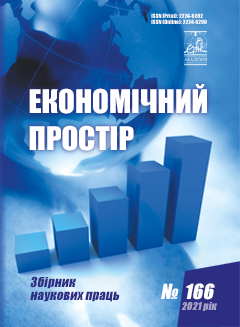THE ROLE OF INTERACTION BETWEEN BUSINESS AND HIGHER EDUCATION INSTITUTIONS IN THE FORMATION OF REGIONAL COMPETITIVE ADVANTAGES
Abstract
The article is devoted to the formation of a sustainable model of interaction between business structures and higher education institutions for the formation of regional competitive advantages. The factors that determine the competitive quali-ty of the regional sphere of intellectual and educational services were identified and the content of the main strategies for the development of higher education in-stitutions in the conditions of regional competition was provided. The content and specific features of the competitive advantages of the region are due to the fact that the modern regional economy is represented by a complex system of territorially integrated production complexes of various industries, spheres and sectors of the economy. It is determined that the interaction of intellectual-educational and production systems as basic spheres of formation and development of competitive advantages of the region is characterized by a multiplier effect arising on the basis of cluster integration of industrial, intellectual-educational and infrastructural spheres within the given territory. The growth of the competitiveness of the regional economy is associated with the realization, first of all, of innovative competitive advantages, although the realization of traditional competitive advantages is also important. It is proved that the innovative development of the regional economy (as determined by competitive advantage) is due to the globalization of the world economy, increased competition, reduced opportunities for extensive development and involves the formation of large universities of innovation and research type as generators of innovation in the regions. It is proved that competitive advantages are concentrated in those regions that intensify innovation in regional education, form a regional economy based on knowledge and communication technologies, accelerate the innovation cycle through the widespread dissemination and transfer of knowledge-intensive technologies and intellectual property generation. Stimulating innovative breakthrough, form of cooperation between universities and employers, creation of corporate universities: concluding an agreement on opening additional programs that reflect the direct order of the enterprise, and the university's task is to implement the order (by creating a specialized scientific infrastructure around universities.
References
Ицковиц Г. Тройная спираль. Университеты – предприятия – государство. Инновации в действии: монография. Томск: ТГУСУР, 2010. 237 с.
Інтегрована система «вища школа-бізнес-структура»: методологія та концептуальні засади побудови : монографія / за ред. В. С. Пономаренка, О. В. Раєвнєвої. Харків : ВД«ІНЖЕК», 2011. 160 с.
Статистичний щорічник України за 2019 р. Державна служба статистики України. за ред. Вернер І.Є. К.: Державна служба статистики України, 2019. 309 с.
Metelenko N.G., Kovalenko O.V., Makedon V.V, Merzhynskyi Y.K., Rudych A. I. Infrastructure security of formation and development of sectoral corporate clusters. Journal of Security and Sustainability Issues. 2019. 9(1). P. 77–89. http://doi.org/10.9770/jssi.2019.9.1(7)
Marić I. Stakeholder analisys of higher education institutions. Interdisciplinary Description of Complex Systems. 2013. No 11(2). Р. 217–226.
Мачуліна І.І. Форми мережевої інтеграції науки, освіти і бізнесу. Ме-тодологія, теорія та практика соціологічного аналізу сучасного суспільства. 2014. №20. С. 123–127.
Македон В.В., Валіков В.П., Кошляк Є.Є. Світовий ринок праці в координатах цифрової економіки. Академічний огляд. 2020. №1 (52). С. 91-107.
Економічна Стратегія України 2030, «Україна – learning nation». Український інститут майбутнього. URL: https://strategy.uifuture.org/ukraina-learning-nation.html
Тимошенков І.В., Нащекіна О.М. Суб’єкти, агенти, актори і стейкхолдери в економічних дослідженнях освіти. Вчені зап. Харк. гуманіт. ун-ту «Нар. укр. акад.». Х., 2012. Т. 18, кн. 1 : Освіта: традиції та інновації в умовах соціальних змін. С. 167–176.
Захаров Н.Н., Черданцев В.П., Тронина М.В. Государственно-частное партнерство в сфере образования – социально-экономический аспект. Фун-даментальные исследования. 2015. № 6(2). С. 340–343.
Лебедева Л.В., Митрофанова А.С. Проблеми комерціалізації системи вищої освіти в Україні за умов формування постіндустріального ладу. Бізнес Інформ. 2017. № 2. C. 65–71.
Ytskovyts H. (2010) Troinaia spyral. Unyversyteti – predpryiatyia – hosu-darstvo. Ynnovatsyy v deistvyy: monohrafyia [Triple helix. Universities – enter-prises – state. Innovation in action: monograph]. THUSUR. (in Russian)
Intehrovana systema «vyshcha shkola-biznes-struktura»: metodolohiia ta kontseptualni zasady pobudovy (2011) [Integrated system «high school-business structure»: methodology and conceptual principles of construction]. Kharkiv: VD «INZhEK».
Statistical Yearbook of Ukraine for 2019 (2019) Statystychnyy shchorichnyk Ukrayiny za 2019 r. [State Statistics Service of Ukraine]. State Statistics Service of Ukraine (in Ukrainian)
Metelenko N.G., Kovalenko O.V., Makedon V.V., Merzhynskyi Y.K., Rudych A. I. (2019) Infrastructure security of formation and development of sec-toral corporate clusters. Journal of Security and Sustainability Issues, 9(1), 77–89. http://doi.org/10.9770/jssi.2019.9.1(7)
Marić I. (2013) Stakeholder analisys of higher education institutions. Inter-disciplinary Description of Complex Systems, No 11(2), Р. 217–226.
Machulina I.I. (2014) Formy merezhevoyi intehratsiyi nauky, osvity i biznesu [Forms of network integration of science, education and business]. Methodology, theory and practice of sociological analysis of modern society, №20, pp. 123–127.
Makedon V.V., Valikov V.P., Koshlyak E.E. (2020) Svitovyy rynok pratsi v koordynatakh tsyfrovoyi ekonomiky. [The world labor market in the coordinates of the digital economy]. Academic review, №1 (52), pp. 91–107.
Economic Strategy of Ukraine 2030, “Ukraine – learning nation”. Ukrainian Institute of the Future [Ekonomichna Stratehiia Ukrainy 2030, «Ukraina – learning nation»], available at : https://strategy.uifuture.org/ukraina-learning-nation.html
Тy’moshenkov I. V., Nashhekina O. M. (2012) Sub’yekty’, agenty’, aktory’ i stejkxoldery’ v ekonomichny’x doslidzhennyax osvity [Subjects, Agents, Actors, and Stakeholders in Economic Studies in Education] Vcheni zap. Xark. gumanit. un-tu «Nar. ukr. akad.»], Education: traditions and innovations in the face of social change, X., T. 18, kn. 1., pp. 167–176. (in Ukrainian)
Zakharov N.N., Cherdantsev V.P., and Tronina M.V. (2015) Gosudarstvenno-chastnoye partnerstvo v sfere obrazovaniya – sotsialno-ekonomicheskiy aspekt [Public-private partnership in education is a socio-economic aspect]. Basic research, no. 6(2), pp. 340–343.
Lebedeva L.V., and Mytrofanova A.S. (2017) Problemy komertsializatsii systemy vyshchoi osvity v Ukraini za umov formuvannia postindustrialnoho ladu [Problems of commercialization of the higher education system in Ukraine in the conditions of postindustrial system formation]. Business Inform, no. 2, pp. 65–71.



